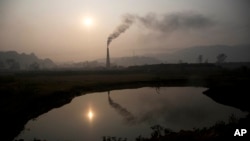Researchers from Harvard University, Princeton University and the Environmental Defense Fund proposed a new, more precise way to measure the effects of greenhouse gas emissions on Earth's climate in an article published on Thursday in the academic journal Science.
The proposal would create a two-digit measurement system the scientists likened to blood pressure readings in medicine, which show the pressure on blood vessels both during heartbeats and in between them. It would help scientists and policymakers account for the fact that some greenhouse gases last longer than others in the atmosphere.
"Different gases have widely different lifetimes in the atmosphere after emission and affect the climate in different ways over widely different time scales," said co-author Michael Oppenheimer, a geosciences professor at Princeton.
The system would show the effects of greenhouse emissions on a 20-year scale and a 100-year scale. Having a measurement that shows both numbers, the scientists argued, would let governments and other institutions trying to reduce greenhouse gas emissions and slow global warming decide which policies would be best in the short term and which should be adopted over the long term.
Opposing groups' methods
It would also help in disputes between opposing advocacy groups. For example, according to the researchers, advocates for using natural gas as an energy source base their arguments on a 100-year timescale. But their opponents, activists lobbying against natural gas, use a 20-year time scale to show the effects of burning natural gas on the climate.
An overwhelming majority of scientists believe emissions of gas like carbon dioxide, which is produced from burning fossil fuels, are contributing to global climate change, triggering sea level increases, droughts and more frequent violent storms.
For the two-value proposal to be successful, the scientists argued, it would have to be widely adopted, not only by individual government agencies like the U.S. Environmental Protection Agency, but also by international bodies like the United Nations and the Intergovernmental Panel on Climate change.
Science is a weekly, peer-reviewed journal published by the American Association for the Advancement of Science.





